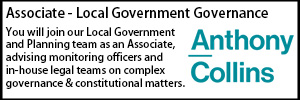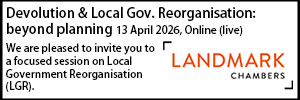Elections in the time of Covid-19
- Details
Rupert Beloff sets out some important considerations for Returning Officers and other election administrators as they look ahead to May's elections.
In March 2020, due to rising concern about the coronavirus pandemic, the Government announced that the local elections scheduled for May would be postponed. This was not the first time that elections had been postponed for public health reasons, in April 2001 local elections had been delayed due to fears over the spread of foot and mouth.
In spite of speculation earlier this year that the elections might have to be postponed again, in February the Government confirmed that those elections scheduled for 6 May 2021 would go ahead alongside those postponed last year. This was followed by statements from the Welsh and Scottish Governments that devolved elections scheduled for the same date would also proceed.
Notwithstanding the current success of the vaccine rollout and the roadmap for easing lockdown restrictions it is inevitable that the pandemic will impact the preparation and conduct of the May elections and various measures have been, or are being, put in place in response. As the UK Government and devolved administrations said in a joint statement issued in March they are “working together across parties and with electoral partners and public health bodies to put in place a set of measures to ensure these polls are COVID-secure and voters can feel confident casting their vote”.
As was noted in Briefing Paper No.08856 “Coronavirus: Elections” due to the postponement of the 2020 elections the May 2021 will be some of the “most complex polls ever held”. Most local authority staff will be running at least two polls often combining different voting systems.
The May 2021 Polls Delivery Plan
On 5 February 2021, the UK Government published a delivery plan for the May elections. It made four commitments, namely that:
- Voters will have a choice between in person and absent voting, with provision being made for last minute proxy voting for those affected by Covid-19.
- Voters, electoral staff, candidates, campaigners, and the wider public are protected from the spread of the disease to the maximum extent possible, with clarity as to how existing public health regulations and guidance apply to essential voting activities.
- Candidates and their agents will have additional guidance on the specific application of social distancing and other regulations to their activities.
- Returning Officers and local authorities will have support from the government that they need to deliver the elections, including additional funding for the extra costs the necessary public health measures will generate.
Nominations
Recognising that it is desirable to reduce person to person secondary legislation has been introduced to reduce the number of signatures required for the nomination of candidates without eliminating the requirement entirely.
The Mayoral and Police and Crime Commissioner Elections (Coronavirus, Nomination of Candidates) (Amendment) Order 2021 (currently draft) and The Local and Greater London Authority Elections (Coronavirus, Nomination of Candidates) (Amendment) Rules 2021 temporarily make the following changes to the required number of subscribers:
- Local Council – 2 (instead of 10).
- Mayor of London – 66 (instead of 330) comprising two subscribers from each London Borough and the City of London.
- Mayor of Single Local Authority Area – 2 (instead of 30).
- Combined Authority Mayor – twice the number of Local Authorities in the Combined Authority area including two subscribers from each Local Authority.
- PCC – twice the number of Local Authorities (or part thereof) in the police area.
Canvassing
Normal canvassing and election activities undertaken by candidates and agents will necessarily have to be limited in line with general public health guidance on coronavirus, for example social distancing. From an electoral administrators’ point of view it is likely that members of the public will raise questions about the polling process and coronavirus restrictions with those canvassing. It is therefore important that there is early and clear communication of all measures to be adopted to candidates and their agents.
In-Person and Absent Voting
The delivery plan makes it clear that the Government does not consider that it is necessary to introduce additional measures for early voting, noting that many voters already vote early by way of postal votes. Nor does it support all postal voting due to concerns about the increased scope for electoral fraud that that would bring and the removal of choice as to voting method from voters. However, anticipating an increase in postal votes, agreement has been reached with Royal Mail to prioritise the delivery of election mail.
In relation to proxy voting the usual rules will continue to apply in most circumstances. However, the (currently draft) Representation of the People (Proxy Vote Applications) (Coronavirus) Regulations 2021 expand the eligibility to vote by proxy for those required or advised to self-isolate due to coronavirus up to 5pm on the day of the poll. Provision will also be made for alternative proxies where the original proxy has been affected by coronavirus and is unable to attend.
Polling Stations and Count Venues
The delivery plan recognises that identifying suitable venues to act as polling stations, count locations and other election locations will be particularly challenging in the current circumstances given that some usual locations will present difficulties for social distancing or be used for other priority activities such as vaccination centres. Additionally, given the significant disruption to education caused by the pandemic, the use of schools should be discouraged where it would lead to the closure of the schools.
The Electoral Commission has published guidance on relevant polling station considerations for the May polls. Measures adopted should be underpinned by the general public health guidance in relation to coronavirus and consideration should be given to:
- One-way systems within polling stations.
- Tape floor markings and signage to ensure social distancing both inside and outside the polling station.
- Signage to inform voters to wear face coverings and that they should not enter the polling station unless they feel well.
- Layout of desks and polling booths to ensure distance is maintained between voters and polling station staff.
- The provision of extra pencils, spare face coverings and hand sanitiser on desks and at entry and exit points.
- Regular cleaning of touchpoints within the polling station.
- Care when handling shared papers and documents.
- Consideration of the use of Perspex screens to protect staff.
- A reduction in the number of polling stations each polling station inspectors is responsible for.
- Where possible the use of staff from within the same household bubble.
- Increased breaks for staff.
- Detailed instruction to staff on the additional measures adopted.
- Communication about the measures to the public, including the use of greeters or marshals at polling stations and other election venues.
The Commission has also published guidance about the accounts and verification process. In relation to venues the considerations are like those set out above in respect of polling stations. However, it is also suggested that:
- Counts should still be commenced as soon as practicable.
- Measures such as screens should continue to support the ability of candidates and agents to oversee and scrutinise the count process.
- A safe system for receipt of ballot boxes at the venue should be implemented.
- Consideration should be given to the use of video streaming of counts and the use of electronic communications to transmit count totals and verification to reconciliation staff.
- Consideration of the grouping if staff into teams of six and limiting interaction between the teams.
- Considering limiting numbers of attendees and counting agents where venue space requires it, whilst maintaining parity for individual candidates.
- There is clear and early communication of steps taken to relevant parties.
In general, it is anticipated that more election staff than usual may be necessary to ensure that election processes can proceed efficiently whilst maintaining appropriate safety measures.
Indemnity
In the delivery plan the Government confirmed that, in the current exceptional circumstances, it would extend the indemnity normally given to Returning Officers in PCC elections to local elections in respect of Covid-19 risks. This is intended to provide adequate coverage where existing local authority insurance does not cover risks associated with coronavirus. This extended indemnity was confirmed and presented to parliament on 25 March.
Conclusions
The elections of 6 May 2021 present a unique and difficult challenge to Returning Officers and other election administrators. Alongside the usual challenges in running and oversee a successful election, there are numerous additional burdens imposed by the requirements of current public health guidance and regulations relating to Covid-19.
These burdens will necessitate more involved than usual set-up and running of polling stations and election venues and careful risk assessment. Election processes are likely to take longer than in normal circumstances and require additional space and staffing.
However, the purpose and duty of election officials remains the overseeing and the efficient and proper running of elections. The usual rules, albeit with some modification, continue to apply. Indeed, it is noteworthy how limited the introduction of new election-specific secondary legislation in response to Covid-19 has been,
Careful planning and clear and early communication to all stakeholders and staff will be key to ensure that this duty is fulfilled.
Rupert Beloff is a barrister at 4-5 Gray's Inn Square.
Governance Officer/Company Secretary
Head of Legal Services / Deputy Monitoring Officer
Locums
Poll

















